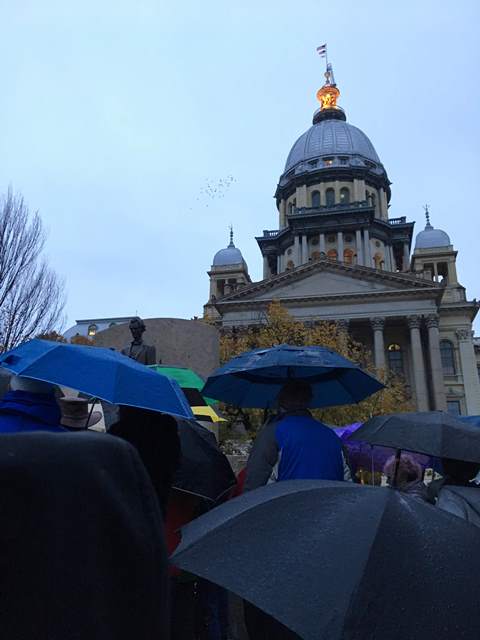This essay was first published on November 18, 2018 in the Springfield State Journal-Register Beliefs column for which Sister Beth Murphy writes regularly.
There is a certain way of reading Jewish and Christian apocalyptic texts that makes excellent B movie material. I believe we are living in an apocalypse—but not that kind!
The word apocalypse means a revelation, or an unveiling. There is a strain of thinking among certain Christian theologians, which I favor, that recognizes the death and resurrection of Jesus as the principle agent of this revelation—an uncovering of “things hidden since the foundation of the world.” (Matthew 13:35)
My most recent apocalyptic—that is to say, revelatory—experience happened in near-darkness. I stood with about 150 other folks in the shadow of the statehouse. We were bundled in coats and shielded from the rain and—in great part from one another—by umbrellas. There the Great Soul to which all humans belong was unveiled for me. It came as a simple intuition, assisted by the anonymity afforded us by the rain, and the umbrellas, and the holy darkness.
Many of us have stood in that place before and will undoubtedly stand there again. This time it was the Jewish Federation prayer vigil to mourn the dead and salve the ragged wounds left by the Tree of Life Synagogue tragedy in Pittsburgh. Seen from the cynical side of life, our vigil was a useless act. From my side, however—from our side—it was far from useless. Rather, it was a creative act of resistance to a self-annihilating hatred that threatens to destroy all creation.
That evening what was revealed to me—what I needed to see—was a full circle: Our Jewish neighbors. My co-religionists. Those representing the diversity of our community. Those of no particular denomination who needed to cry out in defense of our common humanity. The mayor with his cracking voice. The doctor, who’d seen far too much hatred for a lifetime. The retired lawyer with the wisdom of her spirit. The journalists who would magnify our action past the curbside of Second and Capitol. We had our muse, Mr. Lincoln, too. And we had each other.
“My God,” I thought as I trudged the soggy statehouse lawn back to the car, in the dark. “We have everything we need. We have everything we need.” Within that circle of people that night, I believed there could be, and would be, no harm. But earlier, just before heading out the door, I had asked the sisters with me if they had their ID. “I hate to think this way,” I said, “but anything could happen this evening.”
In other words—what could stop someone like the killer in Pittsburgh from finding his way to us? The answer is, nothing could. There is always danger. We are always vulnerable. And, there is always the possibility of good.
I am reminded of something I think of as “a mantra for the apocalypse.” It’s the opening lines from the poem Patmos by Friedrich Hölderlin, which I encountered in a book by French philosopher Rene Girard: God is near/ Yet hard to seize. /Where there is danger,/ The rescue grows as well.
We see well enough what is being unveiled: white supremacy, domination of the poor, the life-sucking, Earth-destroying, universe-killing greed of an oligarchical machine. We see it, alright. And then, under the umbrellas in the soft rain, we see each other, too, and we remember: Where danger grows, so grows that which saves from it.
Anything could—and did—happen that night. At least to me. I experienced what God always promises to the attentive. I saw the danger; I saw the rescue. That was my kind of apocalypse.


